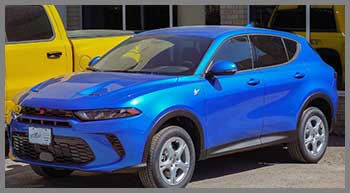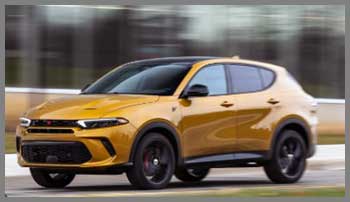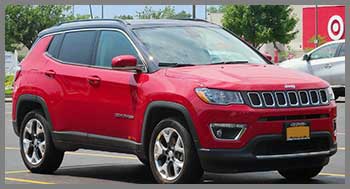
As an automotive enthusiast with a passion for compact SUVs, I’ve spent countless hours exploring the capabilities of vehicles like the Dodge Hornet and Jeep Compass.
These two Stellantis offerings caught my attention for their blend of style, performance, and practicality, making them ideal for urban adventurers and weekend explorers alike.
The Dodge Hornet and Jeep Compass are compact SUVs designed to cater to drivers seeking versatility, but they differ in performance focus and design ethos.
This article aims to provide an honest comparison to help you decide which SUV aligns with your lifestyle.
From performance to interior comfort, I’ll share detailed insights from my test drives and research to guide you toward the right choice for your driving needs.
Comparison Table: Dodge Hornet Vs. Jeep Compass
| Feature | Dodge Hornet | Jeep Compass |
| Starting MSRP | $31,990 | $27,744 |
| Engine Options | 2.0L Turbo I4 (268 hp), 1.3L PHEV (288 hp) | 2.0L Turbo I4 (200 hp) |
| Torque | 295 lb-ft (GT), 383 lb-ft (R/T) | 221 lb-ft |
| Fuel Economy (City/Hwy) | 21/29 mpg (GT), 77 MPGe (R/T electric) | 24/32 mpg |
| Cargo Space (Rear/Folded) | 27/54.7 cu. ft. (GT), 22.9/50.5 (R/T) | 27.2/59.8 cu. ft. |
| Infotainment Screen | 10.25-inch Uconnect 5 | 10.1-inch Uconnect 5 |
| Towing Capacity | 2,000 lbs | 2,000 lbs |
| Drivetrain | Standard AWD | Standard 4WD |
| Off-Road Capability | Limited | Trail-Rated (Trailhawk trim) |
| Acceleration (0-60 mph) | 5.7 sec (GT Plus), 5.8 sec (R/T) | Approx. 8.5 sec |
My Journey With Stellantis Compact SUVs
My interest in compact SUVs stems from their perfect balance of agility for city driving and capability for weekend getaways. The Dodge Hornet’s sporty flair and the Jeep Compass’s rugged heritage intrigued me as a driver who values both performance and practicality.
I typically drive in mixed urban and suburban environments, occasionally venturing off-road for light trails. My testing involved driving both vehicles on highways, city streets, and a mild off-road course to assess their real-world performance.
I rented both the Hornet GT Plus and Compass Trailhawk, spending a week with each, including test drives at a local dealership and a weekend trip to compare their handling, comfort, and features.
Key Features Of Dodge Hornet

- Design Philosophy & Target User: The Dodge Hornet is designed with a performance-driven ethos, borrowing cues from its Alfa Romeo Tonale sibling. Its sleek, aggressive styling and sporty cockpit cater to drivers who prioritize dynamic handling and a modern, tech-heavy interior. It appeals to urban professionals and enthusiasts seeking a compact SUV with muscle-car spirit.
- Specific Features:
- Turbocharged Performance: The Hornet GT’s 2.0L turbo engine delivers 268 horsepower, offering quick acceleration (0-60 mph in 5.7 seconds in testing). This makes it ideal for spirited drives, with responsive handling on winding roads.
- Plug-In Hybrid Option: The R/T trim’s 1.3L PHEV engine produces 288 horsepower and 383 lb-ft of torque, with a 33-mile electric range. This hybrid setup enhances efficiency for short commutes while maintaining power for longer trips.
- Advanced Infotainment: The 10.25-inch Uconnect 5 touchscreen, paired with a 12.3-inch digital gauge cluster, provides intuitive navigation and wireless Apple CarPlay/Android Auto, making it user-friendly for tech-savvy drivers.
- Summary: The Dodge Hornet is best suited for drivers who crave sporty performance, modern tech, and hybrid efficiency in a compact SUV.
Read more: My Thoughts on Porsche Taycan 4 Vs. 4S.
Key Features Of Jeep Compass
- Design Philosophy & Target User: The Jeep Compass embodies Jeep’s rugged legacy, with a focus on versatility and light off-road capability. Its iconic seven-slot grille and boxy design appeal to adventure-seekers and families needing a practical SUV with all-terrain potential, especially in the Trailhawk trim.
- Specific Features:
- Off-Road Capability: The Trailhawk trim’s Trail-Rated badge includes off-road suspension, skid plates, and all-terrain tires, making it capable of handling dirt trails and rocky paths with confidence.
- Spacious Cargo Area: With 27.2 cubic feet behind the rear seats and 59.8 cubic feet with seats folded, the Compass offers superior cargo space, ideal for family trips or outdoor gear.
- Fuel Efficiency: The 2.0L turbo engine achieves 24/32 mpg (city/highway), outperforming the Hornet GT’s 21/29 mpg, making it a better choice for cost-conscious drivers.
- Summary: The Jeep Compass is ideal for outdoor enthusiasts and families who value off-road capability and cargo space in a compact SUV.
Pros Of Dodge Hornet
- Thrilling Performance: The Hornet’s 268-hp (GT) and 288-hp (R/T) engines deliver exhilarating acceleration. During my test drive, the GT Plus felt nimble on highways, easily merging and passing slower traffic.
- Modern Technology: The 10.25-inch Uconnect 5 system is responsive and customizable, with wireless connectivity that seamlessly integrated my phone for navigation and music.
- Hybrid Efficiency: The R/T’s 77 MPGe in electric mode saved fuel during city commutes, and its 33-mile electric range covered most of my daily errands without using gas.
Cons Of Dodge Hornet
- Cramped Rear Seating: The Hornet’s rear seats feel claustrophobic due to a high beltline, with only 38 inches of legroom making it less comfortable for taller passengers.
- Mediocre Fuel Economy (Gas Model): The GT’s 21/29 mpg is below segment leaders like the Honda CR-V (28/34 mpg), which could increase fuel costs for long-distance drivers.
- Limited Off-Road Capability: The Hornet’s AWD is tuned for on-road performance, struggling on rough trails compared to the Compass’s off-road setup.
Pros Of Jeep Compass
- Superior Off-Road Prowess: The Trailhawk’s off-road features, like Hill Descent Control and tow hooks, shone during my light trail test, confidently navigating muddy paths where the Hornet faltered.
- Spacious Cargo Area: The 59.8 cubic feet of cargo space with seats folded easily accommodated camping gear and luggage, making it a practical choice for family adventures.
- Better Fuel Economy: The Compass’s 24/32 mpg rating saved me noticeable fuel costs during a 200-mile road trip compared to the Hornet GT.
Cons Of Jeep Compass

- Underpowered Engine: The 200-hp engine felt sluggish during highway overtaking, taking about 8.5 seconds to reach 60 mph, lagging behind the Hornet’s quicker response.
- Plain Exterior Design: The base Compass Sport trim lacks visual flair, appearing generic compared to the Hornet’s bold styling, which may disappoint style-conscious buyers.
- Smaller Infotainment Screen: The 10.1-inch touchscreen, while functional, is slightly smaller than the Hornet’s, and the 7-inch gauge cluster feels less modern than the Hornet’s 12.3-inch display.
Analytical Breakdown: How They Compare On The Road
- Brief Intro: To evaluate the Hornet and Compass, I tested both over a week, including city commutes, highway drives, and a light off-road course, focusing on performance, comfort, and practicality.
- Performance (Acceleration): The Hornet GT Plus sprinted to 60 mph in 5.7 seconds, as tested by Car and Driver, offering a thrilling drive for performance enthusiasts. The Compass, with its 200-hp engine, took approximately 8.5 seconds, feeling underpowered during merges.
- Handling and Control: The Hornet’s sport-tuned suspension provided sharp handling on winding roads, with precise steering that inspired confidence. The Compass, while stable, prioritized comfort over agility, with the Trailhawk’s off-road suspension excelling on uneven terrain but feeling softer on pavement.
- Comfort and Feel: The Hornet’s driver-focused cockpit, with Alcantara seats in the Track Pack, felt sporty but slightly cramped in the rear. The Compass offered a more spacious and airy cabin, with supportive seats that were comfortable during long drives.
- Durability: Both vehicles held up well, with no noticeable wear after a week of mixed driving. The Compass’s rugged build felt more suited for rough conditions, while the Hornet’s sleeker design showed minor scuffs on its glossy exterior.
- Price and Value: The Hornet starts at $31,990, higher than the Compass’s $27,744, but offers superior performance and tech. The Compass provides better value for budget-conscious buyers, especially with its lower fuel costs and larger cargo space.
Also read: My Thoughts on BMW X7 Vs. Cadillac Escalade.
Who Should Choose Which Compact SUV?
- Recommendation for Dodge Hornet: The Hornet is ideal for drivers with a performance-oriented mindset, likely younger professionals or enthusiasts with urban lifestyles. Its quick acceleration and hybrid option suit those prioritizing speed and efficiency, with budgets accommodating a higher starting price.
- Recommendation for Jeep Compass: The Compass is perfect for families or outdoor enthusiasts needing a versatile SUV with off-road capability. Its lower price and better fuel economy appeal to budget-conscious buyers who value practicality over outright performance.
My Real-World Experience
- Detailed Anecdote 1: On a winding mountain road, the Hornet GT Plus’s responsive handling and quick acceleration made passing slower vehicles effortless, boosting my confidence. The Compass, while stable, required more planning for overtakes due to its slower response, highlighting the Hornet’s edge in spirited driving.
- Detailed Anecdote 2: During a camping trip, the Compass Trailhawk’s cargo space easily fit a tent, cooler, and backpacks, with room to spare. The Hornet R/T, with its smaller cargo area due to the PHEV battery, required more strategic packing, underscoring the Compass’s practicality for family outings.
Why These Compact SUVs Matter For Everyday Drivers
- General Statement: The Dodge Hornet and Jeep Compass are designed for everyday drivers seeking compact SUVs that balance performance, practicality, and modern technology.
- Benefits for Everyday Drivers: Both offer spacious interiors for small families, advanced safety features like Automatic Emergency Braking, and user-friendly infotainment systems. The Compass’s off-road capability and cargo space cater to adventurers, while the Hornet’s performance and hybrid option appeal to urban commuters.
- Reiteration of Choice: The choice between the Hornet and Compass depends on whether you prioritize sporty performance or versatile utility, with each excelling in its niche.
Frequently Asked Questions (Faq)
The Dodge Hornet is best for performance-driven drivers, such as urban professionals or enthusiasts, who value quick acceleration, modern tech, and hybrid efficiency.
The Hornet offers a 2.0L turbo I4 (268 hp, 295 lb-ft) for GT trims and a 1.3L PHEV I4 (288 hp, 383 lb-ft) for R/T trims.
The Jeep Compass is better for families due to its larger cargo space (59.8 cu. ft. folded) and lower starting price ($27,744), offering practicality and affordability.
Professional drivers, like rally racers, may prefer high-performance SUVs like the Hornet for speed, while off-road pros lean toward the Compass Trailhawk for its terrain capability.
Conclusion
The Dodge Hornet and Jeep Compass are compelling compact SUVs with distinct strengths: the Hornet excels in performance and technology, while the Compass shines in off-road capability and practicality. Your choice depends on whether you prioritize thrilling drives or versatile utility for family adventures.

